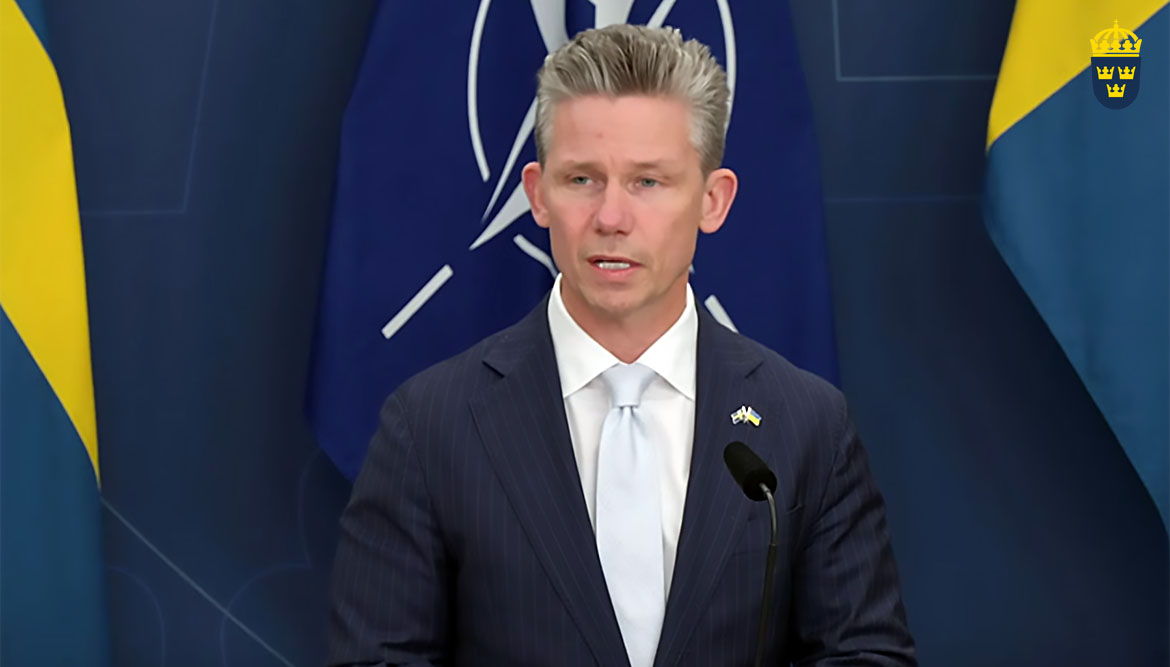Today, the Swedish government announced its most extensive military support package to bolster Ukraine’s military capabilities in the war against Russia. This development, however, raises questions about the broader implications for European security.
The aid package, valued at SEK 13.5 billion (approximately USD 1.2 billion), includes a wide array of military hardware and financial support to enhance Ukraine’s long-range capabilities. This initiative involves funding the production of long-distance missiles and drones, doubling the donation of Combat Boat 90s, and providing anti-tank weapons (PowerPoint presentation).
Swedish Defence Minister Pål Jonson, speaking from the Ministry of Defence, highlighted the urgency and scale of the support:
”This package is designed to significantly strengthen Ukraine’s ability to defend itself and deter further aggression. We are committed to supporting Ukraine with not just immediate military aid but also by fostering long-term defense industry capabilities.”
In addition to Ukraine, Sweden has also decided to extend military support to Moldova, providing the country with m/86 (AT4) anti-tank weapons. This decision, part of the additional amending budget that includes the 18th military support package to Ukraine, marks a broadening of Sweden’s military aid strategy in Eastern Europe.
Related (Jan 2025): US Border Patrol Engages in Gunfire with Cartels in Texas – Cartels Have Swedish RPGs (AT4)
”Moldova, due to its strategic position and the ongoing regional tensions, requires our immediate assistance,” Jonson noted, emphasizing the geopolitical context of Sweden’s actions but without delving into potential long-term security dynamics.
This latest move by Sweden showcases an eagerness to play a more significant role in supporting combat zones, yet it also prompts concerns about the ripple effects on European security.
Read more: The Militarisation of Scandinavia and the Great Northern War 2.0 – Analysis
Critics argue that while the intention is to aid nations under threat, the escalation of military support could lead to a more volatile security environment in Europe, potentially drawing other NATO countries into a deeper involvement without a clear strategy for de-escalation or peace-building.
Supporters, however, see this as a necessary action to counterbalance aggression and stabilize the region, arguing that such support is crucial for deterring further hostilities. They highlight Sweden’s approach as a model of proactive international solidarity and defence cooperation.
As Sweden steps up its military contributions, the broader dialogue on European security remains complex. The implications of these actions on NATO’s strategy, the balance of power in Eastern Europe, and the potential for an arms race are yet to be fully assessed.
The Swedish government’s commitment to this support, without a comprehensive discussion of the consequences, underscores a policy that prioritizes immediate action over long-term strategic analysis, a decision that could reshape the security landscape in Europe for years to come.
Sources and related
- NewsVoice (Jan 30, 2025): Swedish Finance Leader Marcus Wallenberg Urges Innovation for Europe’s Business and Military Competitiveness
- NewsVoice (2024): Swedish Government to Send Combat Boat 90 for Attacks in the Crimean Region
- NewsVoice: The Militarisation of Scandinavia and the Great Northern War 2.0 – Analysis
- NewsVoice: NewsVoice rapporterar från Archipelago Endeavor – en markering mot ryssarna
- Swedish Government (2024): Major investments in Sweden’s military defence expansion
- Swedish Government (Jan 30, 2025): Largest support package to Ukraine announced
- Swedish Government (Jan 30, 2025): Sweden to donate anti-tank weapons to Moldova
- Swedish Government (2024): Sweden increases support to Moldova
- Reuters (2024): Sweden plans $7 billion more military support for Ukraine to 2026


